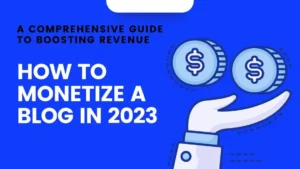In this competitive digital era, blogging has become more than just a hobby; it’s a powerful means of expression, information sharing, and even a source of income for many. But what truly defines a successful blog? In this comprehensive guide, we will delve into the successful blogging tips that can turn your blogging journey into a triumph.
Table of Contents
Finding Your Niche
Identifying Your Passion
Your blog’s success is rooted in your genuine passion. Explore what truly excites you, as genuine enthusiasm translates into compelling content that resonates with your audience.
Researching Popular Niches
While passion is crucial, researching popular niches can provide insights into what attracts a broader audience. Finding the intersection between passion and demand is key to choosing the right niche.
Evaluating Market Demand
Understanding the market demand for your chosen niche is vital. Utilize tools and analytics to gauge the potential audience size and competition in your niche.
Creating High-Quality Content
Importance of Valuable Content
Quality trumps quantity. Craft content that provides real value to your readers. Whether it’s informative articles, entertaining stories, or practical tips, ensure it enriches the reader’s experience.
Understanding Your Audience
Know your audience intimately. Analyze their demographics, preferences, and behaviors. Tailor your content to address their needs, aspirations, and challenges.
Incorporating Visual Elements
In the modern era, where everything moves swiftly, the visual allure holds significant importance. Elevate your content by incorporating compelling images, engaging infographics, and captivating videos to enthrall your audience.
SEO Strategies
Keyword Research
Mastering keyword research is a cornerstone of successful blogging. Identify relevant keywords in your niche and strategically incorporate them into your content to enhance search engine visibility.
On-Page Optimization
Optimize your blog posts with meta titles, descriptions, and headers. Utilize alt tags for images and ensure a clean, user-friendly layout for improved SEO.
Building Quality Backlinks
Establishing a network of quality backlinks from reputable sources elevates your blog’s authority in the eyes of search engines. Focus on organic link-building strategies.
Consistent Posting Schedule
Frequency Matters
Consistency builds trust. Establish a posting timetable that corresponds with your capabilities. Whether it’s daily, bi-weekly, or weekly, stick to a routine that works for you.
Balancing Quality and Quantity
While consistency is vital, never compromise on quality. Strive to maintain a balance between regular posting and delivering valuable, well-crafted content.
Engaging with Your Audience
Responding to Comments
Interact with your audience by addressing comments promptly. Foster a sense of community by acknowledging and appreciating your audience’s input.
Social Media Interaction
Extend your blog’s reach by actively participating in social media platforms. Share your content, engage in discussions, and leverage social media to connect with a broader audience.
Building a Community
Encourage community-building among your readers. Create forums, discussion boards, or exclusive groups where like-minded individuals can connect and share their thoughts.
Monetization Techniques
Ad Revenue
Explore advertising options to monetize your blog. From display ads to sponsored content, strategically incorporate revenue streams without compromising user experience.
Affiliate Marketing
Partner with brands and businesses through affiliate marketing. Promote products/services relevant to your niche, earning commissions for every successful referral.
Selling Digital Products
Transform your knowledge into income by crafting and selling digital products. Ebooks, online courses, and exclusive content can become lucrative revenue streams.
Analytics and Performance Tracking
Monitoring Blog Traffic
Consistently assess your blog’s traffic utilizing tools such as Google Analytics. Understand your audience’s behavior, popular content, and sources of traffic to refine your strategies.
Analyzing User Behavior
Study user behavior on your blog. Identify which posts resonate the most, the average time spent on your site, and any patterns that can inform your content strategy.
Adjusting Strategies Accordingly
Be flexible. If certain strategies are not yielding the desired results, don’t hesitate to pivot. Adapt to changes in the digital landscape and consistently refine your approach.
Staying Updated with Trends
Industry News and Updates
Stay updated on industry trends, changes in algorithms, and the latest advancements in technology. Being informed allows you to adapt your strategies and stay ahead of the curve.
Adapting to Changes
The digital landscape evolves rapidly. Embrace change and be willing to adapt your blogging techniques accordingly. Flexibility is key to long-term success.
Innovating Content
Challenge yourself to innovate. Experiment with new content formats, explore different storytelling methods, and continuously evolve to keep your audience engaged.
Building a Professional Network
Collaborating with Other Bloggers
Networking with fellow bloggers provides opportunities for collaboration, knowledge exchange, and mutual support. Join blogger communities and attend events to expand your network.
Networking on Social Media
Utilize social media not just for audience engagement but also for networking. Connect with influencers, brands, and other bloggers to broaden your reach.
Attending Conferences and Events
Physical or virtual, attending conferences and events in your niche fosters connections and keeps you updated on industry trends. Networking in person or virtually is invaluable.
Time Management
Creating a Blogging Schedule
Efficient time management is crucial. Create a realistic blogging schedule that allows for content creation, promotion, and engagement without burning yourself out.
Avoiding Burnout
Blogging can be demanding. Identify indicators of burnout and, when necessary, make sure to take timely breaks. Maintaining both mental and physical well-being is crucial for long-term success.
Setting Realistic Goals
Set achievable goals for your blog. Whether it’s traffic milestones, revenue targets, or content output, realistic goals keep you motivated without overwhelming you.
Legal Considerations
Understanding Copyright
Respect intellectual property rights. Understand copyright laws, use only licensed images, and give proper credit to sources to avoid legal complications.
Disclosures and Disclaimers
Be transparent with your audience. Clearly disclose any sponsored content, affiliate links, or potential conflicts of interest. Build trust through openness.
Protecting Your Intellectual Property
Safeguard your content. Consider copyrighting your original work and implement measures to prevent unauthorized use of your intellectual property.
Utilizing Email Marketing
Building an Email List
Create and nurture an email list. Direct communication through newsletters allows you to engage with your audience directly and promote new content.
Crafting Engaging Newsletters
Craft newsletters that provide value. Share exclusive content, updates, and personalized messages to keep your audience invested in your blog.
Driving Traffic through Emails
Utilize email marketing to drive traffic to your blog. Incorporate compelling calls-to-action that encourage readers to visit your latest posts.
Learning from Mistakes
Embracing Failure
Mistakes are inevitable. Embrace them as learning opportunities. Analyze what went wrong, adjust your strategies, and grow from each experience.
Analyzing Unsuccessful Endeavors
When a strategy doesn’t yield the expected results, conduct a thorough analysis. Identify the pitfalls, gather insights, and use this information to refine your future approach.
Implementing Changes
Adaptation is key. Based on your analysis, implement changes to your blogging strategies. Continuous improvement is the path to long-term success.
Conclusion
In the dynamic world of blogging, success is a journey, not a destination. Recap these key tips and remember, the most successful bloggers are those who evolve, innovate, and genuinely connect with their audience. Start implementing these strategies today, and watch your blog flourish.
FAQs
- How often should I post on my blog?
- Find a posting frequency that suits your schedule and maintains a balance between quality and consistency.
- Can I monetize my blog from day one?
- While it’s possible, focus on building a solid foundation and audience before heavily monetizing your blog.
- What legal aspects should I consider as a blogger?
- Understand copyright laws, disclose sponsored content, and protect your intellectual property.
- How do I keep up with industry trends?
- Stay informed through industry news, networking, and attending conferences or events in your niche.
- Is it essential to have an email list for my blog?
- Yes, building an email list allows direct communication with your audience and helps drive traffic to your blog.



